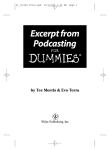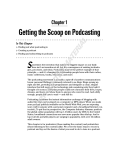Download Wiley Expert Podcasting Practices For Dummies
Transcript
AL 1 Practice Selecting the Right Topic for Your Podcast A Broadening your focus TE Becoming multifaceted RI s Kermit the Frog said, “It’s not easy being green.” While the veracity of this statement is subject to debate, we, the authors of this book, posit to you that selecting the right topic for your podcast is not easy either. The key word in that statement is “right.” We heartily agree that all too many podcasts are chosen without sufficient foresight and planning — the collective decision of one or more parties after too much alcohol, too little sleep, and the auspicious statement, “You know, this would make a great podcast!” In This Practice MA Tapping into the community GH TE D Well, no, we’re not talking about that at all. The title of this book has the words expert practices in it, and we’re certainly not about to start off breaking from the code on the very first practice of the book (even though the authors of this book have been guilty of the aforementioned, on more than one occasion). Heck, by some accounts, the story of how we decided to write our first book together, Podcasting For Dummies, is eerily similar. CO PY RI In this practice, we advocate the use of rational and logical thought to help guide you toward one of the many “right” topics you may choose for your podcast. The truth is, there are probably many topics you are qualified to speak about, that are of interest to a potential audience, and that allow you (as well as any co-hosts or support staff you might employ) to grow and expand. Podcasting is fun. But podcasting with a purpose is sublime. Taking Inventory of Your Interests Let’s start this off with the most important person in the equation: you. No, it’s not your audience. It’s not the community you aim to serve. It’s not even the person who might have paid you to pick up the mic and start cranking out episodes. We’ll even tell you that it isn’t your spouse, though as we say this we cast a wary eye over our shoulders, burning through even more SPUs (which we explain later). The host of the show is the lifeblood of the show. We’re not trying to put undue pressure on you, but your show won’t get very far if the topic isn’t 10 Practice 1: Selecting the Right Topic for Your Podcast something that you (a) want to talk about and (b) can talk about while (c) demonstrating that you know what you’re talking about. So what can you talk about? What do you want to talk about? Jot down what you like to do for fun What else turns your crank that you enjoy doing in your leisure time? All work and no play makes Jack a very boring podcaster whom no one much wants to To be fair, you may have had the idea of doing a pod- listen to or talk with. And let’s face it, the possibilicast thrust upon you as part of your job. That’s fine. ties for entertainment-focused podcasts are endless. Unless your boss has arranged for someone to hand you a completed script to read in front of the micro- Look — you don’t have to be in this for the money. Some of the best-produced and most rewarding phone (in which case, you probably aren’t reading shows are created by people for the sheer fun of it. this anyhow), you’ll still benefit from the suggesPerhaps you are an avid bowler and would like to tions in this section. share your passion with others. Maybe you know a ridiculous amount about beer. Perhaps your friends List what aspects of your job interest you all turn to you for information when it comes to obscure knots and stitches, and everyone knows it Like it or not, we spend a lot of time at our jobs, takes you half as long to knit a sweater than anyone developing skills and competencies we use in our else on the block. personal lives as well. While there is no question that some of your daily tasks at a job might fall into The idea is to find out what you are passionate about. the mind-numbing category, examine those parts of Jot down a few ideas and see if you can come up with your job that you do find interesting. five or six subtopics worthy of further discussion. And remember that you don’t have to be the most Notice we didn’t say day job. The reality is that for knowledgeable person on the planet on a given topic. many people with the drive and ambition to even If you have the passion, it might be fun to take your consider becoming podcasters, the wearing of two hats is commonplace. It’s not uncommon to take off listeners on the journey as you learn more. the Accountant hat at 5:30 and assume the mantle of Community Organizer, Sports Memorabilia Collector, or Classic Car Restorer. These are every bit as much of a profession as that which provides the majority of your household income. The pay just stinks. Filling a Niche by Focusing on a Specific Area of Interest We recommend making a list of the things you do in your profession that most interest you, keeping the following points in mind: You can get very specific or very broad — you can always refine or group tasks together later. Be sure to include the aspects of professional affiliations, groups, or associations to which you may belong. Within all of these are hidden gems that may very well lead you to the right topic. Deciding what topics you can talk about is an important step, but it’s time for the application of what we like to call Jurassic Park logic. JP logic requires you to ask yourself this question: You’ve spent a lot of time thinking about whether you could, but have you figured out whether you should? While we’re not trying to put you into tidy boxes or for an instant suggest that adding your voice to a busy conversation is a waste of time, we are suggesting that you strive to introduce a new topic to the podosphere, or find an underserved audience. Yes, you could create yet another music podcast featuring an eclectic mix of podsafe music artists. But realize that you will be competing with the dozens — perhaps Narrowing Your Focus to Make Your Show Unique hundreds — of shows out there doing basically the same thing. The suggestions in the previous section should have given you more than one idea. If one of those ideas is adequately (and only you can decide this) covered by a host of other shows, consider moving on to the next topic. Practice 2 covers a few podcastdiscovery ideas. You’ll best serve the current and future audience of podcast listeners by selecting a niche topic. This stands in stark contrast to traditional broadcast media, where the idea is to select broad-reaching topics to maximize the coverage area. That’s fine in a world where only so many stations fit on a radio dial, but that’s not where we live. Go for the small and focused. It’s where you’ll find the most loyal audience just waiting for you to start talking. Determining whether you’ll have enough to talk about One of the perils of going niche is making sure you have enough material with which you can create new episodes. A show centered around the intricacies of reattaching lost buttons to ladies’ blouses might limit your options in the future. However, that might make an excellent episode of a podcast about tailoring or seamstressing (is that a word?). Our advice is to write down the topics and subtopics that come to mind. Don’t worry — you’re not planning out your show production schedule for the next six months. If you can list ten items of interest with only a few minutes of thought, you’ll probably be fine. You never know when show topics will hit you, so figure out a system for jotting down the inspirations when they strike. One of your authors uses a portable Moleskine notebook (overpriced notebook, claims the second); the other keeps an outliner application at the ready (though the first wonders why inspiration only strikes at the keyboard). Figure out what system works best for you. Heck, sticky notes are a great way to start. Anything that allows you to collect ideas as they come is good to have. 11 Considering whether anyone will listen Once you know you have enough to get started on your first five to ten episodes, you’ll want to do a final sanity check: Is there anybody out there waiting to listen? We hesitated before putting this section out there and remain torn as of this writing. But in the end, practicality won out. You can have exceptional diction, excellent production values, and extraordinary content — but someone other than you and your mom needs to care. Luckily, this shouldn’t be a problem for you; more (sometimes way more) than one person always seems to be interested in the most obscure things out there. Keep in mind, however, that audience size and podcast topic are intimately related. If a large audience is your goal (and we’re not saying it should be), then select a topic that appeals to many. Narrowing Your Focus to Make Your Show Unique Let’s revisit that music podcast we spoke of earlier in this practice. You’ve got the DJ bug bad, and no amount of rationale or arguing will sway you from your goal. Fine. Far be it from us to get in the way of your passion. A surefire way to differentiate yourself from other shows is to dig into the minutiae of your chosen topic. Hyperspecialization So maybe that crazy idea we had about sewing buttons on ladies’ blouses isn’t so crazy after all? Let’s face it — there are lots of types of buttons out there and lots of places on which you can sew them. Different configurations, styles, backings . . . and don’t get us started on the various types of buttonholes and the related stitching! This might seem an extreme example, but it’s easily ported into nearly any topic. Instead of covering something as broad as sports marketing, how about focusing on the extreme sports market or promoting 12 Practice 1: Selecting the Right Topic for Your Podcast and financing Ultimate Fighting Championship matches? When you narrow your focus to specific elements within a specific topic, sometimes you can actually uncover more content. Now, that may sound counterintuitive, but consider the extreme-sports marketing angle. A show on general sports marketing might turn off an audience if the host delves into the venue-selection process for rock climbing to maximize sponsorship branding. And if you can make a compelling podcast about that topic. . . . Hyperlocalization Even though podcasts can and do reach a global audience, going hyperlocal is another great way to set your show apart from the rest. Forget covering sports marketing for the entire U.S. market — cover the challenges and rewards of doing the job in Peoria, Illinois. How many community, school, or enthusiast teams are there in an area — each giving you a number of potential listeners? And don’t think that hyperlocal means that only local people will listen. While the content may be local and relevant to those in a local area, the concept may appeal to a wider audience. It’s no big leap of faith to assume that someone working to market a disc-golf tournament in Flagstaff, Arizona, could get some great advice from the sports marketer in Peoria — even if the producers never specifically talk about disc-golf tournaments. Broadening Your Focus to Appeal to New Listeners Strange as it may sound, taking the opposite road — broadening your focus — can also lead to a great podcast topic. Often, in fact, this advice can offer the most benefit to established podcasters looking to step up their game or appeal to a wider audience. And while we love the idea of getting down to brass tacks with your topic, it’s not always the right path for every show. Becoming multifaceted Just because you neatly fill a niche with your show doesn’t mean that’s the only niche you can fill. (Specialization may be the most commonly offered evidence of natural selection, but it’s the ability to survive when the nature of the game changes that keeps the species going.) If you’re going for multiple niches, make sure they are related in some way. Combining your passion for extreme-sports marketing and your fascination with button application might be taking things a bit too far, and you’re almost guaranteed to alienate half of your audience — unless (say) there’s some new extreme sports with some equally extreme fastening mechanisms. But no, probably not even then. . . . Becoming multifaceted often happens after a show has been underway for a while, as the host discovers “niches within the niche” — and perhaps even tangential affinities — while exploring the main topic at hand. While these can certainly digress from the show’s original intent, they can also indicate an untapped interest — for the podcaster and the listening audience. Go ahead and explore these side projects. Let your audience know that you’re taking a brief off-topic stroll if you feel it necessary. Change is a natural part of life, and as long as you’re not going completely off the deep end, your audience will allow you some latitude. Tapping into the community Speaking of your audience — ask your listeners what they think and where you should take the show. Broadening Your Focus to Appeal to New Listeners A little of this technique goes a long way. Don’t use it as a crutch when you’re out of things to talk about. And certainly don’t use it in your first 20 episodes. There are few things more annoying than a show host begging the audience to come up with ideas. Audiences see that as laziness on the part of the host, and they quickly find someone else willing to put forth the necessary effort to keep producing the content they want to hear. Instead of asking your listeners outright what you should do, pay attention to the feedback they provide you about the shows you produce. We go into great detail about feedback and how to get it in Practice 34. One thing you’ll learn is that podcast listeners aren’t afraid of letting you know what they think of your show. When something out of the ordinary that you do strikes a chord with them — either positively or 13 negatively — they’ll speak up. Pay attention to this feedback and look for ways to keep doing more of the things they like. You can also consider learning more about your audience and tailoring the show to their needs. If your show on women’s hat fashion from the 1960s is frequented by a high percentage of listeners from the Eastern seaboard (you can find this in your server log files), consider adding a recurring segment dedicated to the life and times of Jackie Kennedy-Onassis. The idea is to play to the audience. Find out about them with surveys and server logs, or engage them in an ongoing dialogue. Yes, the show is about you, by you, and should be of primary importance to you. But surely there is some common ground between you and your audience, or they wouldn’t be listening to you in the first place.














